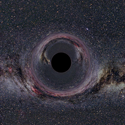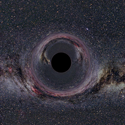Cosmic nudity
Despite its long and proud history, classical general relativity contains many unresolved profound questions. For instance, black holes are known to be stable solutions of general relativity in four spacetime dimensions; however, how stable are they in higher dimensions? Another important example concerns the nature of gravitational singularities and the cosmic censorship conjecture, which posits that generic black hole singularities are “clothed” by an event horizon; that is, the event horizon prevents the black hole from being observed. These questions are of fundamental conceptual importance in the understanding of gravity in regimes relevant to the search for a quantum theory of gravity—an outstanding intellectual challenge in theoretical physics.
In a paper published in Physical Review Letters, Luis Lehner from the University of Guelph and the Perimeter Institute for Theoretical Physics, both in Canada, and Frans Pretorius from Princeton University, US, perform a detailed numerical study of extended black hole solutions, known as black strings, in five dimensions. They find that black strings are unstable and that they tend to evolve to a state that violates the cosmic censorship conjecture. The absence of ad hoc fine tuning in the study makes this result robust and generic. Apart from being an important advance in general relativity, this insight is likely to be important for efforts to quantize classical gravity in a consistent fashion. – Abhishek Agarwal





